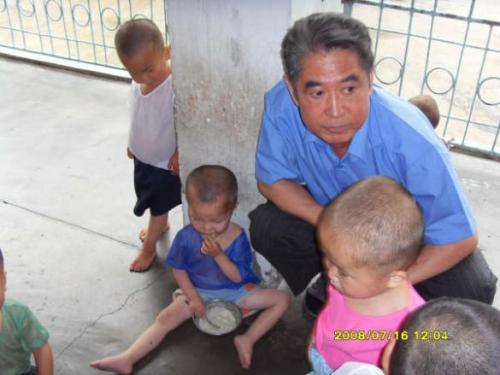Han lobbying for laws to allow American families to adopt N.K. orphans
His hard-won adoption by an American professor transformed Han Sang-man’s destiny from that of a North Korean street boy to a successful U.S. businessman with the means to help other refugees.
His adoptive father, Arthur Schneider, took the orphaned Han under his wing while serving here in the aftermath of the Korean War. Schneider then lobbied the U.S. government to pass a special law that in 1961 legally allowed Han to live with him in America.
His hard-won adoption by an American professor transformed Han Sang-man’s destiny from that of a North Korean street boy to a successful U.S. businessman with the means to help other refugees.
His adoptive father, Arthur Schneider, took the orphaned Han under his wing while serving here in the aftermath of the Korean War. Schneider then lobbied the U.S. government to pass a special law that in 1961 legally allowed Han to live with him in America.

Now Sam Han ― as he became known on arriving in Minnesota aged 16 ― is fighting to give many more North Korean children the chance to find loving homes in the U.S.
The terminally ill charity founder is campaigning to have the North Korean Refugee Adoption Act of 2011 passed in the U.S. Senate and House of Representatives.
If passed, the bill would allow U.S. citizens to adopt North Korean children who have successfully fled Pyongyang’s oppressive regime, but are now living in poverty in third countries such as China.
Han said there were many willing families waiting to take them in, but the U.S. government must first help them overcome hurdles from the legality of the adoptions and mediating with third countries to transporting the children to the U.S.
“The Hague Treaty has a clause about Human Trafficking that does not allow U.S. citizens to adopt North Koreans because of North Korean Law,” he told The Korea Herald.
“What this law does is it forces several departments within the U.S. government to figure out a way for the legal adoption of North Korean orphans.”
Han set up the Han-Schneider International Children’s Foundation ― which runs orphanages in North Korea, as well as helping children in Cambodia and Tanzania ― in honor of his father and is using the organization to gather support for his campaign.
He has already collected more than 20,000 signatures and has set an August deadline for all campaigners to submit petitions, after which Han will personally deliver them to Congress to show support for the bill.
Han’s work has taken on extra urgency in light of his diagnosis with cancer in 2002.
Still battling the disease, Han is now pulling out all the stops to get the bill passed as his dying wish.
“Being currently diagnosed with terminal cancer and fighting for my own life, the passage of this bill within the time I have left is my parting wish. Its passage would allow the peace of knowing that the great nation that saved me as a child has not turned its back on my suffering kinspeople,” he said.
And he foresees many American families taking the chance to help these kinspeople, should the bill be passed.
“We would definitely see a trend of more adoptions by Korean-Americans and eventually all Americans,” he said.
“There are so many great married couples who wish to adopt a child and I know that they would be more than happy to have a North Korean orphan join them.”
He said that recent support from the Korean community in America had been great, though the political will had taken time to gain momentum.
“Inside Washington, the political response has been slow to develop,” he said.
“That is understandable considering what is on their plate right now with issues such as the debt ceiling, funding three wars and healthcare reform. However, it is starting to pick up significantly. Just in the past few weeks we have had several co-sponsors sign on for the bill.”
The bill has been sponsored by Senator Burr of North Carolina and co-sponsored by Senator Landrieu of Louisiana and its corresponding house bill was introduced by Congressman Ed Royce of California.
Han has also written to President Barak Obama to appeal for help in saving North Korean children “living on a razor’s edge” as refugees.
He wrote: “The introduction of this bill is another step in fulfilling my lifelong dream of saving forlorn child refugees from North Korea who are hiding in developing countries.
“They precariously cling to life they live in mortal fear of being caught and sent back to the North.”
However, even if the law is passed, Han foresees further difficulties in rescuing orphaned kids. “Once the law is passed, the biggest hurdle will be China,” he said.
“China undoubtedly will side with North Korea and there will be some sort of raise of tensions between the U.S. and China should we proceed.
“Also, once a child is legally able to be adopted, the biggest issue will be the psychological scars that these children have developed from fear.”
Han also acknowledged that the campaign could make his charity’s work in North Korea more difficult, but added that the benefit of rescuing North Korean orphans to give them a better life in the U.S. was too great to be ignored.
He said: “There is that risk, however, I feel this bill is too important for our organization not to be involved. Personally, this bill is something I have felt has needed to be addressed for decades.”
By Kirsty Taylor (kirstyt@heraldcorp.com)



















![[Today’s K-pop] BTS pop-up event to come to Seoul](http://res.heraldm.com/phpwas/restmb_idxmake.php?idx=642&simg=/content/image/2024/04/17/20240417050734_0.jpg&u=)